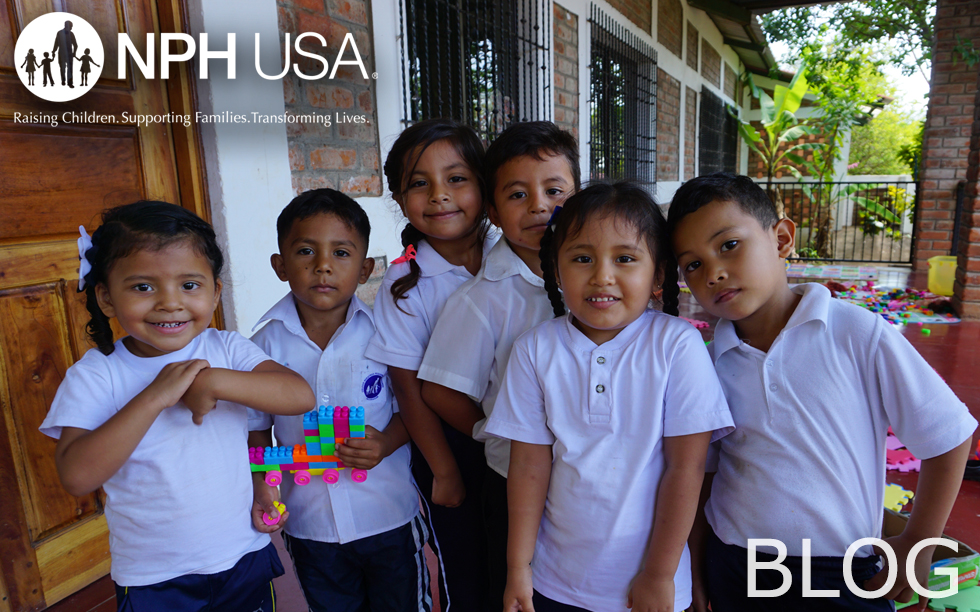The
below observations were written by Kim Dumke, National Manager, Marketing
at NPH USA about her trip to NPH Honduras for a NPH communications
officers meeting.
1. The Ranch is famous!
Before landing in Tegucigalpa, I
told a flight attendant that I would be visiting Nuestros Pequeños Hermanos.
That did not ring a bell with him, nor did “Rancho Santa Fe.” But then I told
him that people call it “the Ranch.” He replied, “Oh, the Ranch! I’ve heard of
that!”
2. NPH = safe
haven.
There are beautiful mountains and
lots of trees on the route to the Ranch, but there are also streets in
disrepair, piles of trash along the road, and shelters made of scrap metal and
wood. Just as in Mexico and Nicaragua, which I had previously visited, the NPH
site is a sanctuary that feels far removed from its third world surroundings.
The property extends as far as you can see and is peaceful, despite the fact
that it is home to more than 400 children, and has a medical clinic and surgery
center that are bustling with people who come from far and wide for help.
3. The children
welcomed me with open arms – literally.
As I walked around the grounds,
random children I had never met ran over to hug me and exchange a few words.
One little boy wrapped his arms around me tightly, pressed his head against my
ribs and refused to let go, even when other kids lightly swatted him on the
head and ran away giggling. He eventually released me because it was almost
dinner time.
4. Eating local – mostly.
Meals are simple but nourishing,
with various combinations of rice, beans, vegetables, eggs and cheese. Because
of an ongoing drought, they are currently getting their beans from Ethiopia.
However, the eggs come from the home’s farm, as does the milk for the chees,
which is made on-site, along with tortillas and bread.
5. “Snack” is in
the eye of the beholder.
During a tour of the school, I
saw kids contentedly snacking on whole cucumbers from the farm as if they were
candy bars.
6. An old tire
makes a great planter.
They practice Reduce, Reuse,
Recycle on the Ranch. Trash is separated. Fallen branches and live trees are
used for fence posts and dead trees are used for fire wood. They avoid cutting
down trees if possible, and even build around them in some cases. Thanks to
solar water heaters, you can take a hot shower, which is surprising in a
country that lacks the infrastructure and public services we take for granted
in the U.S.
7. Everything in
its place.
At the storeroom, there is a
place for everything, and everything is in its place, or signed out in a record
book.
8. Adult
supervision is not always required.
At one of the houses, I saw a boy
go down a slide on top of a tall plastic crate. I was sure this would result in
a trip to the clinic, but before I could say anything and before the next boy
got his turn, a girl no more than 8 years old took the crate and set it out of
reach. To my surprise, there was no screaming or whining; the boys just resumed
sliding.
9. The children
love their sponsors.
I have sponsored a boy at NPH
Guatemala for 12 years so I know how important godparents are to the children,
but this visit reinforced it. Some children asked me if I was their “Madrina”
(Godmother) or if I would be, and everywhere I went, I heard kids – even those
who have just started talking – calling, “Madrina!” I am still not sure how I
escaped without having another dozen Godchildren!
10. Everyone loves the babies’ house.
It is no surprise that visitors
love to spend time at the babies’ house where children up to age 7 live.
However, I was surprised to see a sheep roaming freely along the courtyard!
“Sheep” as it is called is no visitor, though; it lives there and never has to
go far to find someone to pet it.
Photo credit: Iris Vanessa Salinas Castellanos,
Coordinator of the Babies' House
Often when people hear the word
“orphanage,” they think of a dismal place full of skinny, dirty children hoping
to be adopted. If you visit an NPH home, you will see the term does not apply.
Instead you will meet healthy children who are content knowing that they have a
“forever” home, a loving family and the chance to transcend poverty to become
productive citizens. This is only possible because of our caring supporters
from around the world. I hope you know that you are making a difference for
thousands of boys and girls.







No comments:
Post a Comment
Note: Only a member of this blog may post a comment.